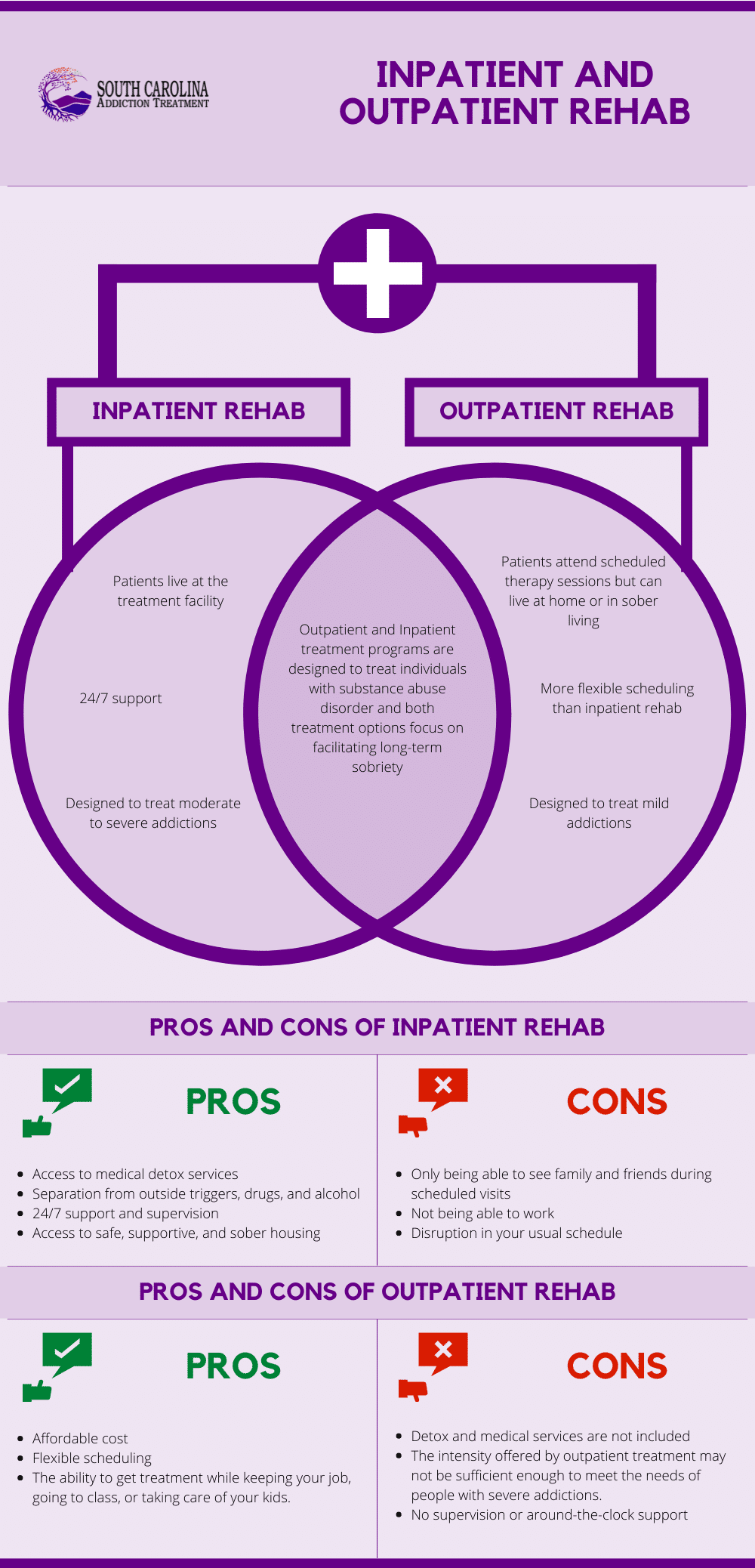Types of Addiction Treatment: Inpatient vs. Outpatient

Medically Verified: 2/1/24
Medical Reviewer
Chief Editor

All of the information on this page has been reviewed and verified by a certified addiction professional.
Figuring out which type of addiction treatment program is right for you is an important step towards your recovery. Every person who struggles with drug or alcohol abuse is unique, so different people have different needs. As a result, a treatment program that works for one person might not be the best fit for another.
Drug and alcohol abuse programs in South Carolina typically consist of two options: inpatient and outpatient rehab. Both types of addiction treatment are focused on therapy and rehabilitation services, but inpatient programs are more intensive and are a better fit for people with severe substance use disorders. Outpatient programs, on the other hand, are a more flexible option for people who either can’t go to residential treatment or don’t require 24/7 medical and clinical support.
To better understand which program is right for you, it’s important to understand the signs of addiction and the key differences between the two treatment options. When you are educated about your rehab options and choose the one that best meets your needs, you will put yourself on the right track towards sobriety.
Signs You or a Loved One Need Addiction Treatment
If your drug or alcohol abuse is starting to have serious negative effects on your life, it’s time to consider getting help. There are many warning signs that indicate a need for professional help, including:[1]
- Inability to control how much or how often you use drugs or drink alcohol
- Having a desire to quit but have been unsuccessful
- Experiencing cravings for drugs or alcohol
- Having problems with work, school, family, or relationships
- Experiencing withdrawal symptoms when you sober up
- Needing to drink increasing amounts of alcohol/take increasing amounts of drugs to produce the effects you desire
- Loss of interest in old interests and responsibilities
- Spending a lot of time getting drugs/alcohol, using them, and recovering from the effects of them
The more symptoms you experience, the more severe your addiction is. When you take the first step to pick up the phone and call for help, a substance abuse counselor will speak with you about your drug and alcohol abuse to determine which type of addiction treatment is right for you.
Inpatient Rehab
Inpatient treatment programs, which are also known as residential rehab programs, require patients to live at the treatment facility or associated housing throughout the duration of their treatment. While enrolled at the substance abuse clinic, patients have access to around-the-clock emotional support and medical care. The primary purpose of this type of addiction treatment is that patients are removed from environments that might trigger their substance abuse. Instead, patients are able to focus fully on their recovery without outside distractions.
The length of inpatient treatment varies depending on the treatment center and the patients’ individual needs. Although some programs only last 28 days, others may retain patients for several months or longer until their clinician determines that the patient is healthy enough to leave treatment.
Many people who check into inpatient programs require medical drug or alcohol detox, so this is usually the first phase of treatment. However, the vast majority of treatment is spent participating in group and individual therapies as well as 12-step meetings or educational activities. While in therapy, patients will work with their primary therapist to uncover the root causes of their addictions and learn how to replace negative behaviors with ones that support sobriety.
24/7 supervision and support are what make inpatient rehab programs highly effective and ideal for people who suffer from severe substance use disorders. If you have tried outpatient before and relapsed, are experiencing withdrawal symptoms, suffer from a mental health condition, and/or don’t have a supportive home environment, inpatient addiction treatment is right for you.[2]
Outpatient Programming
Intensive outpatient programming (IOP) and outpatient programming (OP) are two additional types of addiction treatment that provide less restrictive and more flexible rehabilitation services. IOP programs typically meet 3-5 times a week for several hours while OP programs meet 1-2 times a week for an hour or two at a time. Both programs involve group and individual therapies similar to those offered during residential treatment.
Outpatient drug and alcohol programs allow patients to live at home while participating in therapy during the week. This flexible schedule allows patients to continue working or caring for their families throughout rehab. At the same time, these programs heavily encourage 12-step participation to further help recovering addicts stay sober.
Outpatient treatment programs in South Carolina place a heavy focus on drug abuse education, reinforcement of coping skills, and relapse prevention counseling. Sometimes, these programs are used as an aftercare option for people who have already completed inpatient rehab. However, outpatient programs are also a great option for people who:
- Can’t take time off work to go to residential rehab
- Have children they take care of and can’t go to inpatient treatment
- Have a mild substance use disorder that doesn’t require medical detox or clinical supervision
- Is living in a sober living home or has a supportive home environment
Although outpatient programs typically cost less than residential programs, the cost of treatment shouldn’t deter you from seeking the best type of addiction treatment for you.
Find The Right Type of Addiction Treatment Program For You

No matter which type of treatment you choose, seeking help for addiction can mean the difference between life and death. Addiction is a chronic and deadly disease and sobriety is a lifelong endeavor. However, with the help of experienced medical professionals and mental health counselors, you can get started on the right track towards sobriety.
Take the first and most important step today by reaching out for help. Contact us today to learn about our drug and alcohol treatment programs in South Carolina.
References:

